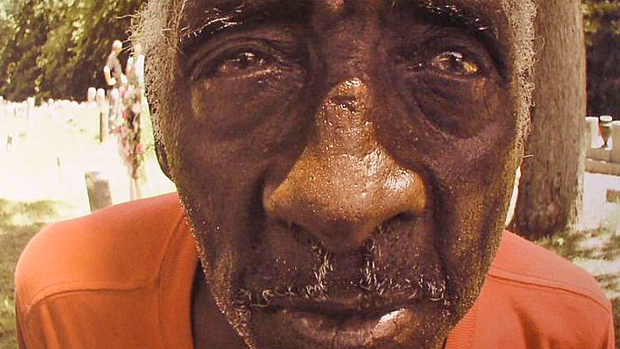
Article by Rebecca Long – Photos by Lou Bopp
–

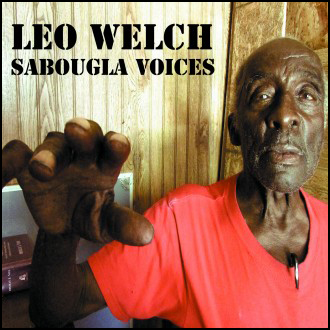 The recent revelation of an undiscovered real-deal octogenarian blues musician picking around Calhoun County, Mississippi, got almost instant national coverage. Leo “Bud” Welch has released his debut album at the age of 81. The ten-track blues/gospel LP, entitled Sabougla Voices, was recorded and mastered last summer by Bruce Watson at Dial Back Sound in Water Valley and was released January 7 of this year on Big Legal Mess, a subsidiary label of Fat Possum Records. Welch sings and plays guitar on the record, and he’s backed with an all-star cast of North Mississippi musicians who let Welch and his Sabougla Voices (Martha and Laverne Conley) take the lead: Jimbo Mathus helps out on guitar, Bronson Tew on bass, Eric Carlton (Tri-State Coalition) on keys, Andrew Bryant (Water Liars) on drums and organ, and Matt Patton (Drive-By Truckers, The Dexateens) on bass and guitar.
The recent revelation of an undiscovered real-deal octogenarian blues musician picking around Calhoun County, Mississippi, got almost instant national coverage. Leo “Bud” Welch has released his debut album at the age of 81. The ten-track blues/gospel LP, entitled Sabougla Voices, was recorded and mastered last summer by Bruce Watson at Dial Back Sound in Water Valley and was released January 7 of this year on Big Legal Mess, a subsidiary label of Fat Possum Records. Welch sings and plays guitar on the record, and he’s backed with an all-star cast of North Mississippi musicians who let Welch and his Sabougla Voices (Martha and Laverne Conley) take the lead: Jimbo Mathus helps out on guitar, Bronson Tew on bass, Eric Carlton (Tri-State Coalition) on keys, Andrew Bryant (Water Liars) on drums and organ, and Matt Patton (Drive-By Truckers, The Dexateens) on bass and guitar.
Last Spring, Leo “Bud” Welch was asked by his now-manager and biggest fan Vencie Varnado to perform at his birthday party; Varnado secretly recorded the performance as Welch’s demo to send to a record label. Varnado contacted Bruce Watson at Fat Possum Records, who showed immediate interest. According to Welch in a recent interview with Zach McCormick, “Vencie sent off the recording to Bruce, and then Bruce listened to and Bruce got it and played it to his people, and in two weeks we was in then in about two more weeks we was done recording!” Welch, living in the tiny town of Bruce, Mississippi, reportedly decided to contact Fat Possum Records when he heard about the late-in-life discovery of late North Mississippi blues great Junior Kimbrough. Though Kimbrough was originally recorded in 1966, those tapes weren’t released until 2009 (when Bruce Watson bought the masters and the song rights); seventeen short years earlier in 1992, Kimbrough gained national attention at 62 years old with All Night Long, recorded by Robert Palmer for Fat Possum. Similarly, the early recordings of Mississippi John Hurt only reached a small audience, whereas his more popular 1964 Library of Congress recordings were taped when he was 71 years old. Even Mississippi Fred McDowell was only 55 years old when he was ‘discovered’ and recorded by Alan Lomax in 1959. Like Leo Welch, McDowell blurred the lines between Delta Blues and Hill Country Blues, and mixed gospel themes into his music, recording songs like “Woke Up This Morning with My Mind on Jesus” and “Wished I Was in Heaven Sitting Down.”
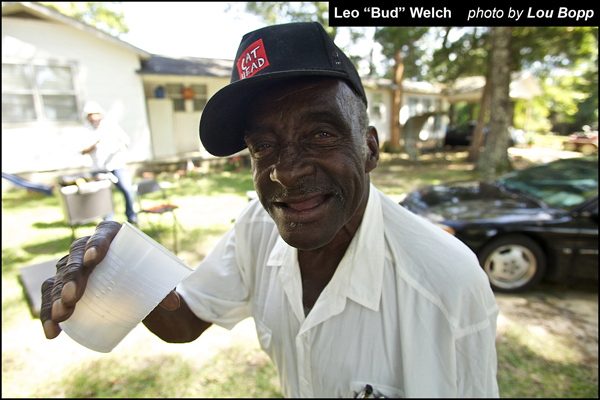 This album’s release has brought up an old maxim: “Saturday night is for blues, and Sunday morning is for gospel.” After hearing the sound Leo Welch has developed, I think we can finally throw that adage out the window – blues and gospel can live in righteous harmony (pun intended). Sabougla Voices is a far cry from sold-my-soul-to-the-Devil blues or my-woman-done-left-me blues, but its tracks contain every sign a Blues-hound needs to tell that the music was made after spending a lot of time in Mississippi. After a recent trip home to the Delta, it’s fair to say there’s almost a church ‘around every corner;’ religion is so entrenched in the music and culture of this state, sometimes it’s hard to keep Saturday night and Sunday morning separated. The word gospel comes from the combination of two Old English words, and it translates as “good news.” And whether or not you believe the religious message scattered throughout, Sabougla Voices is ‘good news’ for the blues. Welch is singing for all our souls.
This album’s release has brought up an old maxim: “Saturday night is for blues, and Sunday morning is for gospel.” After hearing the sound Leo Welch has developed, I think we can finally throw that adage out the window – blues and gospel can live in righteous harmony (pun intended). Sabougla Voices is a far cry from sold-my-soul-to-the-Devil blues or my-woman-done-left-me blues, but its tracks contain every sign a Blues-hound needs to tell that the music was made after spending a lot of time in Mississippi. After a recent trip home to the Delta, it’s fair to say there’s almost a church ‘around every corner;’ religion is so entrenched in the music and culture of this state, sometimes it’s hard to keep Saturday night and Sunday morning separated. The word gospel comes from the combination of two Old English words, and it translates as “good news.” And whether or not you believe the religious message scattered throughout, Sabougla Voices is ‘good news’ for the blues. Welch is singing for all our souls.
The suspended droning groove of North Mississippi Hill Country Blues is absolutely present in songs like “Praise His Name” (the album’s powerful beginning track) and “Take Care of Me Lord” (I call this song ‘a Hill Country Blues prayer’). The album features classic call-and-response gospel-style tunes like “Somebody Touched Me” and “Praying Time,” alongside the righteously joyous “You Can’t Hurry God.” Growing up in the South, one would be hard-pressed not to have heard similar versions of some of these songs. Many are traditional tunes, though Welch wrote “His Holy Name” (with its driving bass line) and “Praise His Name,” the album-opener whose lyrics bear Welch’s message: “I’ve come to praise His name.” The unmistakable sound of electric Delta Blues prevails on “A Long Journey,” and the song carries a familiar mortal message: “I’m going on a long, long journey after a while. I’m gonna lay my burdens down, goin’ on home and wear my crown.” This idea of the ‘final journey’ we’ll all take one day is not new to the Blues – it’s a very similar message to Charley Patton’s line, “Well, I’m on my journey” in his classic “Jesus Is a Dying Bed Maker,” to name one example.
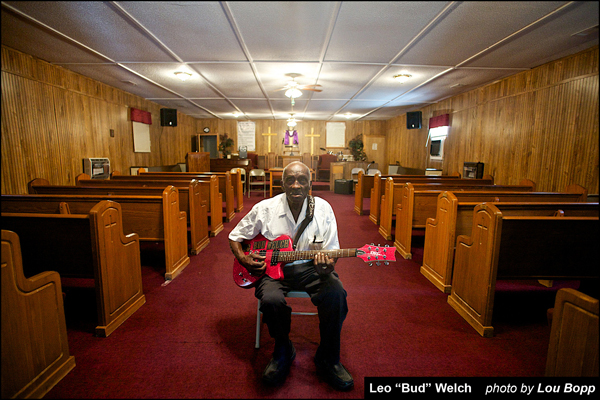 Where Leo Welch’s talent really shines, though, is on the slower, stripped-down tracks “The Lord Will Make a Way” and “Mother Loves Her Children.” The latter became my favorite track after the first listen; goosebumps ensue when I hear the slow, soulful refrain of “A mother, she loves her children all the time. No matter what the crime, mother will always always say, ‘That child is mine.’ And your mother loves her children all the time.” Welch’s powerful voice shines in “The Lord Will Make a Way,” just a man and his guitar. Welch has said of this track, “That’s the way was I learned how to really play coming up, playing an acoustic guitar, just me and my guitar and myself and the good Lord. And that’s the reason why I knew someday the Lord will make a way. He’ll make a way somehow…I’m glad to be here on this day.” Welch started out playing when he was about thirteen, and later picked up the harmonica and fiddle. In another interview he recalls, “I learned how to tune it in my own way and I called that ‘High Tune,’ after that we learned how to tune it in Spanish and everything, and I been playing ever since. One of the first songs that I ever learned to hit a note or two on was “Baby Please Don’t Go.””
Where Leo Welch’s talent really shines, though, is on the slower, stripped-down tracks “The Lord Will Make a Way” and “Mother Loves Her Children.” The latter became my favorite track after the first listen; goosebumps ensue when I hear the slow, soulful refrain of “A mother, she loves her children all the time. No matter what the crime, mother will always always say, ‘That child is mine.’ And your mother loves her children all the time.” Welch’s powerful voice shines in “The Lord Will Make a Way,” just a man and his guitar. Welch has said of this track, “That’s the way was I learned how to really play coming up, playing an acoustic guitar, just me and my guitar and myself and the good Lord. And that’s the reason why I knew someday the Lord will make a way. He’ll make a way somehow…I’m glad to be here on this day.” Welch started out playing when he was about thirteen, and later picked up the harmonica and fiddle. In another interview he recalls, “I learned how to tune it in my own way and I called that ‘High Tune,’ after that we learned how to tune it in Spanish and everything, and I been playing ever since. One of the first songs that I ever learned to hit a note or two on was “Baby Please Don’t Go.””
If you haven’t yet read the back-story on this musical find of a man, Welch was born in 1932 in rural Sabougla (pronounced shah-boog-lah), Mississippi. In a recent interview he said, “I love living out in the country, but Sabougla wasn’t nothing but a two-store spot. It’s a country town. There was only two stores, wasn’t even a post office there. There wasn’t no law in town, it was all just country people. My home was, I call it the “in the sticks, just a house in the middle of a cotton field or corn field somewhere.” He later moved to Bruce and, after working during the day, if he wasn’t too tired he would play at house parties, or three-day country picnics during the summer.
Around 1975 he took his brand of blues into the area’s churches. In the excellent liner notes for Sabougla Voices, Kevin Nutt points out, “The churches offered a place where a musician like Leo Welch could still play his style, just slightly modified for the gospel. But Welch never let the blues go. He has never seen any reason to: “I believe in the Lord, but the blues speaks to life, too. Blues has a feeling just like gospel; they just don’t have a book (a Bible).””
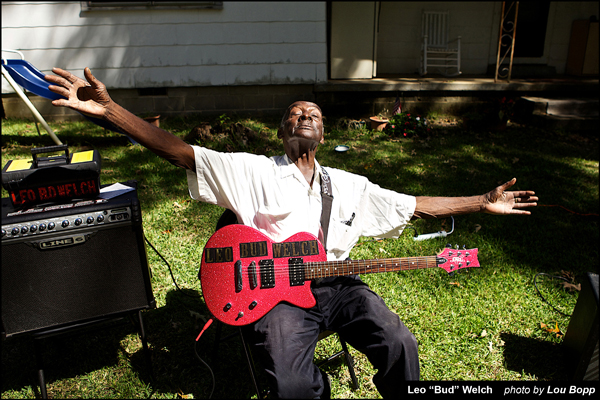 As far as the blues/gospel issue, Welch basically shrugs it off. Recently he was asked, “Do you think playing the blues and playing gospel are all that different?” and he responded, “It ain’t much different. Listen, the only thing that’s different in ‘em is the words in what songs we’re singing. When you’re signing gospel and playing blues or singing blues, all those things almost sound alike! The music all will sound alike, you know? There isn’t much difference in gospel music and blues music; it’s all about the same in my book.”
As far as the blues/gospel issue, Welch basically shrugs it off. Recently he was asked, “Do you think playing the blues and playing gospel are all that different?” and he responded, “It ain’t much different. Listen, the only thing that’s different in ‘em is the words in what songs we’re singing. When you’re signing gospel and playing blues or singing blues, all those things almost sound alike! The music all will sound alike, you know? There isn’t much difference in gospel music and blues music; it’s all about the same in my book.”
Clarksdale blues authority Roger Stolle vouches that Welch is “the first significant, real-deal, old-school Mississippi bluesman to pop up in a long time.” Welch plays regularly in Clarksdale at Red’s Lounge, plus at Ground Zero Blues Club, and Hambone Gallery. And this spring (probably March), Welch will be featured in the “Moonshine & Mojo Hands” web series (moonshineandmojohands.com), created by Stolle and Jeff Konkel (of Broke & Hungry Records), and produced by Lou Bopp (responsible for TLV #196’s excellent cover photo). In an interview last week, Welch said that Sabougla Voices is just the beginning, and that we can expect a Blues record next. In the meantime, though, enjoy this brand new record while it’s still spinning. Don’t have your copy yet? No problem: The End of All Music has ‘em in stock (and your vinyl will come with a digital download card).
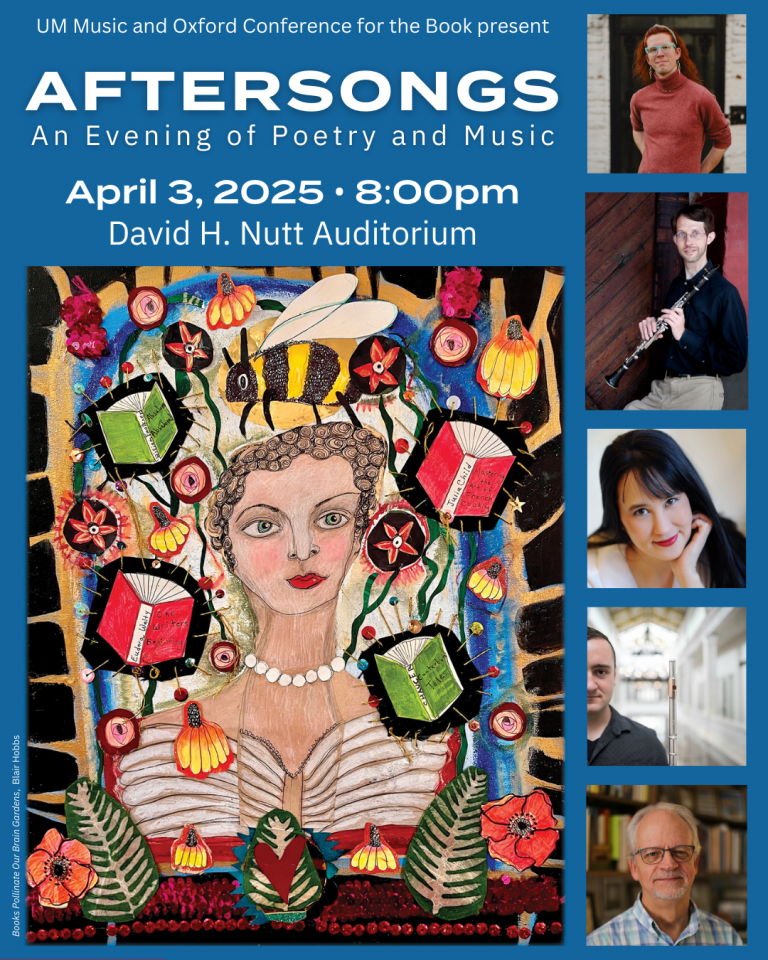


And we are glad and proud to offer next June Leo’s first trip to Europe, where he’ll perform the Blues Rules Crissier Festival in Switzerland (June 7th & 8th)
HOPE TO MEET HIM AT THE KING BISCUIT (okt) , OUR SOME WHERE ELSE .